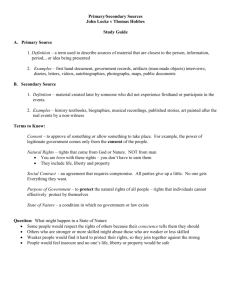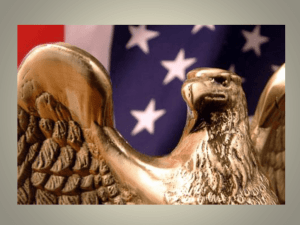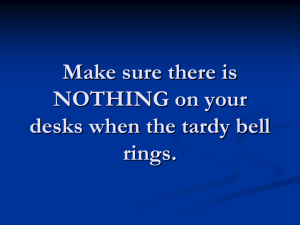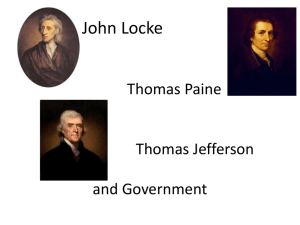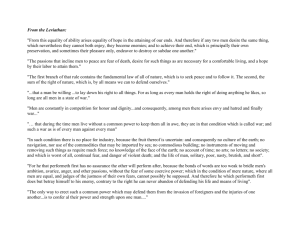John Locke
advertisement
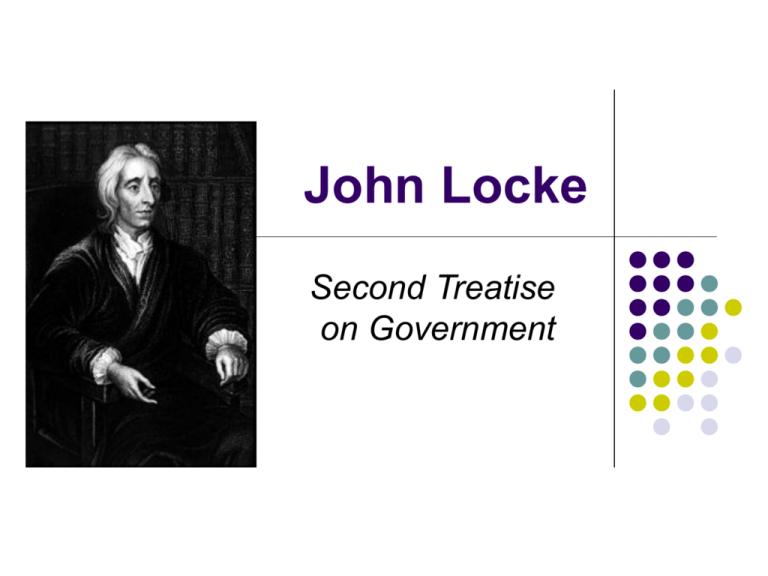
John Locke Second Treatise on Government Locke’s Second Treatise I. II. III. IV. Biographical/Historical Background State of Nature One Freedom, Liberty, and License Property and Labor I. Historical Background John Locke (1632 – 1704) Enters Oxford in 1651 Studies philosophy, natural history, medicine Becomes physician and advisor to First Earl of Shaftesbury (big Whig politician) Reign of Charles II, Charles dies in 1685 I. Historical Background Line of succession issue (Catholic vs. Protestant) Locke – through Shaftesbury – gets implicated in plot to assassinate James Leaves England for Holland in 1683 Begins to write anonymous political pamphlets, including the Two Treatises on Government (1689) I. Historical Background 1688 “Glorious Revolution” in England Replace the Catholic line from James with William and Mary (both Protestant) Locke was an advisor to William while the two of them were in Holland together In exchange for throne, William & Mary agreed to a more limited, constitutional monarchy Signed “Toleration Act” which allowed for religious toleration for most faiths (except Catholicism and Unitarianism) I. Historical Background Locke lives out his days on government pension … without further ado, Locke’s Second Treatise II. Locke begins Chapter 2: State of Nature 1 “To understand political power right, and derive it from its original, me must consider what state all men are naturally in…” What we need to know, then, is the natural condition of mankind II. Continuing with the quote from the opening of Chapter 2 State of Nature 1 “… and that is a state of perfect freedom to order their actions, and dispose of their possessions, and persons as they think fit, within the bounds of the law of Nature, without asking leave, or depending upon the will of any other man.” What does that mean? II. State of Nature 1 Individuals living in state of nature Also seems we need to know 3 things: 1. 2. 3. Freedom Law of nature Property Rights II. Freedom, Liberty, License Two senses of freedom at work here Free from any social bonds, which means Not dependent on the will of any other people I can do “X” without asking someone else’s approval to do “X” Bear in mind, he is saying that this freedom is natural; that we naturally are free from any social constraints or relations Note: to this point in human history, very few people could be said to enjoy freedom in this sense II. Freedom, Liberty, License But it’s not just any freedom, rather it’s freedom in accord with “the law of nature” And that law is: “The state of Nature has a law of Nature to govern it, which obliges every one: and reason, which is that law, teaches all mankind, who will but consult it, that being all equal and independent, no one ought to harm another in his life, health, liberty, or possessions” (chp.2, par 6). II. Freedom, Liberty, License We get 2 arguments to support this view: 1. Religious 2. Each of us is created in God’s image We don’t have the right to destroy ourselves (as we are God’s creatures), so we can’t have the right to destroy others like us Secular “equal and independent” phrase Moral sympathy and rationality II. Freedom, Liberty, License Summary In state of nature we have freedom, which is life in accordance with the law of nature Distinction between liberty and license For Locke, liberty is not the right to do everything, but rather to do anything in accordance with the law of nature II. Locke contra Hobbes Freedom, Liberty, License Locke basically agrees with the structure of Hobbes’ argument, but disagrees with his account There is a sense in which people in Hobbes state of nature have freedom, but it is not a freedom we would want; it is self-defeating But…How can I be free if I must obey a law? II. Drug addict example Freedom, Liberty, License Do I want to be the kind of person who smokes crack? Do I want to smoke crack now? Or now? Or.. Only the first person is truly free, and that person is obeying a rule or law Freer in that life is more fully an expression of your own will When following the laws of nature, you are following the dictates of your own reason and nothing else II. Freedom, Liberty, License In other words, freedom does not mean war… it means peace! Think of interpersonal interaction … do we need a sovereign to tell us what is right? II. Freedom, Liberty, License So for Locke, state of nature is when we are all free, indeed it is a state of perfect freedom Also a state of equality, since no one is forced to submit to any authority higher than the dictates of her own reason II. Freedom, Liberty, License Chapter 2 “A state also of equality, wherein all the power and jurisdiction is reciprocal, no one having more than another: there being nothing more evident, than that creatures of the same species and rank promiscuously born to all the same advantages of Nature, and the use of the same faculties, should also be equal one amongst another without subordination or subjection, unless the Lord and Master of them all, should by any manifest declaration of his will set one above another, and confer on him by an evident and clear appointment an undoubted right to dominion and sovereignty.” II. Freedom, Liberty, License For Hobbes, freedom and equality were in large measure responsible for the state of nature being a war of all against all For Locke, freedom and equality lead to a radically different situation II. Freedom, Liberty, License “Men living together according to reason, without a common superior on Earth, with authority to judge between them, is properly the state of Nature” (chp. 3, par. 19). II. Freedom, Liberty, License Which raises the question of why we would ever leave the state of nature? Why not anarchy? Do we find any problems lurking in the state of nature????

